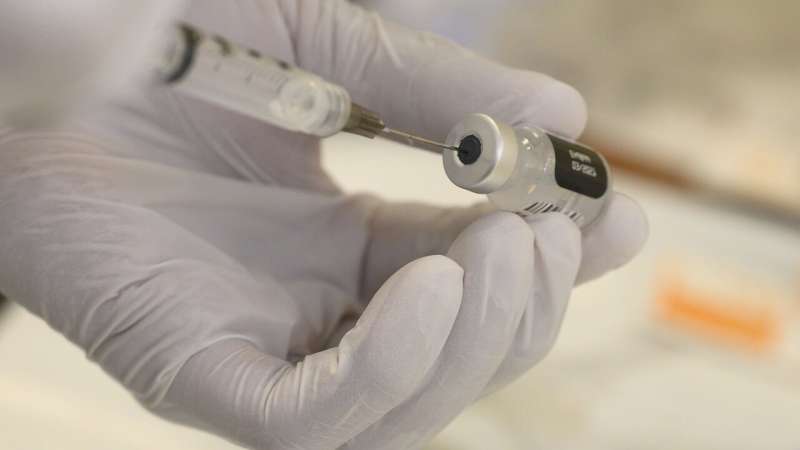This article has been reviewed according to Science X's editorial process and policies. Editors have highlighted the following attributes while ensuring the content's credibility:
fact-checked
peer-reviewed publication
trusted source
proofread
New research shines light on how COVID-19 vaccination reduces severity and mortality after breakthrough infections

In one of the largest studies of its kind, researchers provide answers to whether COVID-19 vaccinations reduce sickness and mortality following infection with SARS-CoV-2.
The study published in The Lancet Microbe found among individuals recently infected with SARS-CoV-2, those who were fully vaccinated had lower concentrations of almost all inflammation markers (cytokines and chemokines) than those who were unvaccinated in the short-term and long-term after symptomatic SARS-CoV-2 infection.
While vaccinations don't entirely prevent infection, this study demonstrates that vaccination significantly reduces morbidity and mortality by significantly reducing elevated levels of cytokines and chemokines that are correlated with a higher risk of severe infection.
"Our research demonstrates the long-term benefits of the COVID-19 vaccines to reduce inflammation even after a breakthrough infection," said co-author Alison Abraham, Ph.D., MS, MHS, associate professor of epidemiology at the Colorado School of Public Health. "Understanding how to prevent long-term complications and death with COVID-19 and how vaccination prevents those outcomes is critically important to opening doors for more targeted therapy for those who get severe disease."
The authors of the study, led by Johns Hopkins Medicine, say it is among the first to look at how COVID-19 vaccination may affect these inflammatory markers over time among those recently infected.
To study the levels of the cytokines and chemokines, the researchers collected blood samples from nearly 900 vaccinated and unvaccinated patients during multiple visits over 90 days post symptom onset. This allowed the trajectories of cytokines and chemokines to be assessed after infection and differences in trajectories to be evaluated between vaccinated and unvaccinated participants.
The researchers looked at the associations between COVID-19 vaccination status and concentrations of 21 cytokines and chemokines (measured using multiplexed sandwich immunoassays) and examined multivariate linear mixed-effects regression models, adjusted for age, sex, BMI, hypertension, diabetes, convalescent or control plasma and COVID-19 waves (pre-alpha or alpha and delta).
"Unlocking the why, when and how the cytokine storm produced by SARS-CoV-2 will mean improved control over how we care for patients and develop treatments," said senior author Aaron Tobian, MD, Ph.D., professor of pathology, medicine and epidemiology at the Johns Hopkins University School of Medicine.
"In other words, answering how the COVID-19 vaccine works to prevent worse disease, longer term disease and death can help us better treat patients by providing solutions to limit the body's overexuberant inflammatory response," adds Tobian.
They found initially and during recovery from symptomatic COVID-19, fully vaccinated participants had lower concentrations of inflammatory markers than unvaccinated participants, suggesting vaccination is associated with short-term and long-term reduction in inflammation, which could in part, explain the reduced disease severity, mortality and risk of long COVID in vaccinated individuals.
The authors say this data will also help with research to prepare for future epidemics but want people to also remember vaccinations are still a critical tool to combat COVID-19 currently.
"COVID-19 has not disappeared and vaccinations are still our major tool to combat the disease, especially if there would be another severe wave of the virus in the future," said first author Joshua Xianming Zhu, a biostatistician in the department of pathology at the Johns Hopkins University School of Medicine.
More information: Dynamics of inflammatory responses after SARS-CoV-2 infection by vaccination status: a prospective cohort study, The Lancet Microbe (2023).




















